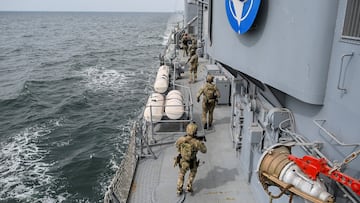Why isn’t Israel a member of NATO? Geopolitical reasons for the exclusion
The NATO Secretary General said that “Israel does not stand alone” in October after Hamas attacked. Despite the high Gazan death toll support has remained.

During the Israeli offensive in Gaza, Israel, for the most part, has been able to count on the support of the members of the North Atlantic Treaty Organization (NATO). Though not a formal member, Israel has fostered a close bond with many members, especially the US, as a critical ally in one of the world’s most turbulent regions.
NATO was established as a collective defense alliance for North America and Western Europe, primarily focusing on the North Atlantic region. Israel, being located in the Levant, is outside the geographical scope of the alliance. While it has had close security cooperation with the US and other Western countries, Israel has not sought formal membership in defense alliances like NATO. Turkey, a neighbor of Israel, on the other hand, joined NATO in 1952.
Despite this, the military alliance and Israel are close allies. The NATO website describes their relationship:
“For more than twenty years, Israel has been an active NATO partner through the Mediterranean Dialogue, the only security forum that brings together NATO Allies with Israel and Arab countries. In 2017, Israel established a permanent and official mission to NATO headquarters.”
Israel’s conduct in its invasion of Gaza has come under scrutiny in some NATO nations, however. While nearly all are backing the Israeli government, Turkey has broken rank and explicitly criticized the Israeli government. Since the military assault on Gaza began, millions of Turkish citizens have shown solidarity with the Palestinian cause and people in massive protests.
Spain and Belgium, also NATO members, have continued to fund the United Nations Relief and Works Agency (UNRWA) after the United States and the United Kingdom suspended funds to the organization after allegations from the Israeli government that workers had participated in the attack on 7 October. While these countries have condemned the alleged participation, the governments see UNRWA’s work as too crucial during the humanitarian crisis that is unfolding in Gaza to stop the sending of aid. Last week, twenty-six of twenty-seven European Union members passed a ceasefire resolution; the only opposition came from Hungary, which is a NATO member.
What is happening in Palestine and Israel right now?
It has been six months since Israel’s military invasion of Gaza began following the attacks carried out by Palestinian resistance groups led by Hamas, which is backed by Iran. The attacks carried out on 7 October were a violent manifestation of the deteriorating situation for Palestinians in the region and claimed the lives of more than 760 Israeli civilians. According to the Swiss-based humanitarian organization Euro-Med Monitor, the Israeli assault on Gaza has killed over 38,000 people, of which 34,570 are thought to be civilians.
More than 70,000 injuries have been reported, and nearly one hundred percent of the population has been displaced and on the brink of famine.
The wider context
Israel has fought numerous wars against its Arab neighbours, furious with the sudden birth of a Jewish state in lands given away by the British Empire at the end of the Second World War. Israel’s final major war with outside powers was waged in 1973, the Yom Kippur war, and has since occupied a considerable portion of Palestinian territory in the face of international law.
The closest to a lasting peace between Israelis and Palestinians occurred with the signing of the Oslo Accords in 1993. Israel agreed to hand governance of Gaza and the West Bank to a Palestinian Authority in return for Palestinian recognition of Israel. Since then, peace has drifted further apart with the current Israeli leadership in its most extreme right-wing incarnation.
“The Jewish people have an exclusive and inalienable right over all areas of the Land of Israel,” stated the new Israeli governing coalition. “The government will promote and develop the settlement of all parts of the Land of Israel — in the Galilee, the Negev, the Golan and Judea and Samaria,” referring to the occupied West Bank. While his allies in Washington DC have reaffirmed their commitment to the two-state solution, Prime Minister Benjamin Netanyahu has rejected the proposal. On 18 February, he said in a speech that “Israel will continue to oppose the unilateral recognition of a Palestinian state.” He put the question to the country’s legislative body, the Knesset.
However, for many Palestinians, international legal theorists, and those supportive of the Palestinian cause, returning to the status quo of Israel’s occupation of Gaza and the West Bank is unacceptable in a post-war scenario. Michael Lynk, the UN Special Rapporteur for the situation of human rights in the Palestinian territory occupied since 1967, has described the actions of Israel in the occupied Palestinian territories as apartheid. This is the prioritization of rights to one group over another on the basis of one’s racial-national-ethnic identity, most prominently recognized in South Africa between 1948 and 1994. This view is supported by numerous human rights groups around the world, including Human Rights Watch and Amnesty International.
Bringing it all back to NATO, nearly all members of the alliance have come out in support of Israel, discussing the right of the country to defend itself. Palestinians can rely on no such support, and as with all conflicts, it is the civilians that are the greatest victims of the violence.





